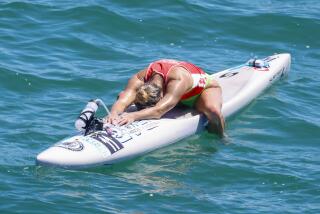Running on empty
- Share via
IF you’ve ever felt as if a workout drained you to exhaustion, consider a Gatorade ad that’s been on TV recently. It shows footage of a runner staggering into the home stretch of a race, then collapsing like an inflatable toy pierced by a BB.
He tries to crawl to the finish line but stumbles and goes horizontal as medics rush in to help.
It’s a mix of horror and inspiration -- especially when you learn that the footage is real, shot at the 1997 Ironman Triathlon in Kona, Hawaii. The racer, Australian Chris Legh, now 32, told us what happened that day -- or at least the parts he remembers.
“From the start I was having problems keeping fluids down. I kept chasing [trying to drink to replace lost fluids], but puked it all back up.” After finishing the 2.4-mile swim, Legh started the 112-mile bicycling segment about six minutes behind the leaders.
“I caught them, and there was only about four of us left,” Legh said. “Imagine a 24-year-old athlete at the lead of the Ironman: You’re not going to give up.”
Then came the last leg: a full marathon, 26.2 miles of running. “I thought if I just shut my eyes and made it to the end, I’d be all right. I came up about 50 meters too short.”
Robert Murray, director of the Gatorade Sports Science Institute in Barrington, Ill., worked with Legh on training and hydration after the 1997 race. He said the Australian was near death when he collapsed. “Part of his large intestine had become necrotic” -- by which he means dead -- “due to dehydration.”
Dehydration causes blood volume to drop and, in severe cases, the body cannot deliver sufficient blood to all organs and muscles. To preserve flow to the most vital organs, such as the brain, the body first ceases delivery to less-crucial areas, such as the intestine, Murray said.
“In Chris’ case, it was an almost fatal mistake of passing up aid stations and neglecting to take in fluid. You get so far along [in dehydration] that you lose the power of decision-making.”
Legh agrees. “From about 10 miles out [from the finish], I knew I was in trouble,” he said. “From about eight miles out, I can only remember patches. I’m glad I can’t really remember all of it.”
He returned to racing five months later, winning a half-Ironman and, one month later, placing second in a full Ironman. In 2004 he won an Ironman race.
The lesson for weekend warriors? Proper hydration is crucial.
Ideally you will start each exercise session adequately hydrated and either drink enough during exercise (a little bit every 10 to 15 minutes) or refuel very soon after finishing to replace fluid lost by sweating. You should weigh the same after an exercise session as you did before.
For longer bouts -- say, more than an hour -- in which you sweat a lot, replacing sodium during exercise is key, either with a sports drink or a salty snack.
Endurance athletes and those participating in unusually time-consuming physical activities face a slight risk of hyponatremia -- overhydrating to the point of dangerously diluting blood-sodium levels. But this risk is almost nonexistent for typical exercisers who engage in fitness activities for 30 to 90 minutes at a stretch. Marathon runners and serious outdoor athletes should learn about the condition.
*
(BEGIN TEXT OF INFOBOX)
Fluid mechanics
Proper hydration is key to training and competing. Runners should try to replace fluids at the rate that they lose them.
To make sure you’re drinking the right amount, weigh yourself undressed before and after a run, says Douglas Casa, director of athletic training education at the University of Connecticut.
For every pound lost, drink 1 pint of fluid (or for every kilogram lost, 1 liter of fluid). Weight gain is an indication of too much fluid intake, so decrease the amount of fluids. If your weight doesn’t change, you’re on target.
Because heat affects perspiration, weigh yourself at various times during the year and adjust fluids accordingly.
Don’t rely on thirst as an indicator of when to drink, Casa says. As a rule, drink 20 to 30 ounces two hours before a run, and an additional 6 to 8 ounces just before heading out.
Runners who take off first thing in the morning should drink 20 to 30 ounces a couple of hours before going to bed, then 6 to 8 ounces more just before starting to run.
-- Jeannine Stein
More to Read
Go beyond the scoreboard
Get the latest on L.A.'s teams in the daily Sports Report newsletter.
You may occasionally receive promotional content from the Los Angeles Times.










